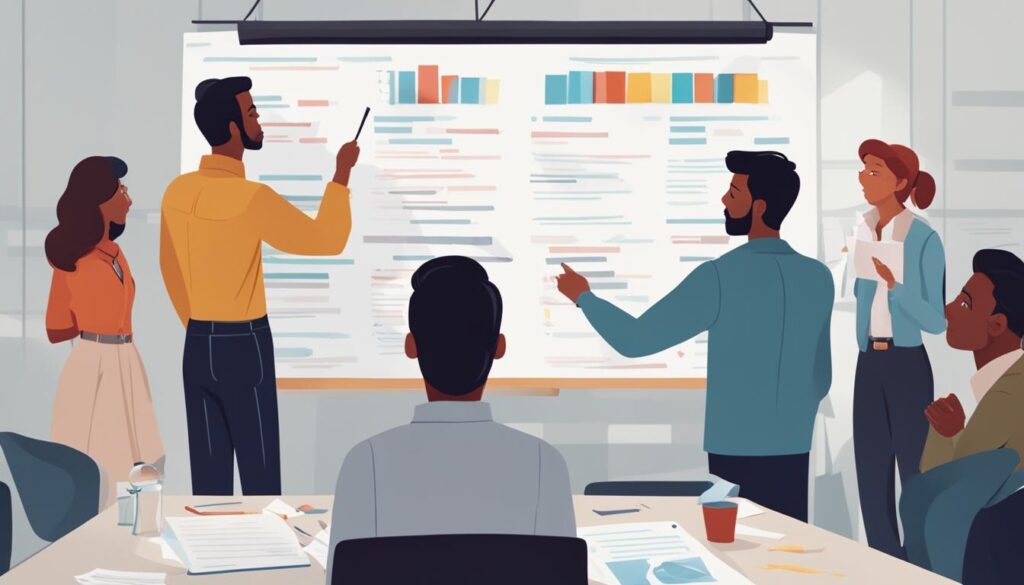We may earn money or products from the companies mentioned in this post.
If you’re an event planner, conference organizer or workshop facilitator, you know that organizing workshops and panels isn’t just about selecting the right speakers or creating an engaging agenda. It’s about meticulous organization, effective execution, and ensuring a seamless experience for all participants.
In this comprehensive guide, we’ll cover everything you need to know about workshop and panel organization, from event management and conference planning to panel discussions, workshop facilitation, event logistics, and session scheduling.
Key Takeaways:
- Workshop and panel organization requires attention to detail and effective execution
- Event management and conference planning are integral to the success of workshops and panels
- Panel discussions require careful selection of panelists, engaging discussion topics, and effective moderation
- Workshop facilitation strategies include instructional design, interactive exercises, and technology integration
- Efficient event logistics, such as session scheduling and on-site support, are crucial for a successful event
Understanding the Importance of Workshop and Panel Organization
Workshops and panel discussions are valuable opportunities to share knowledge, network with like-minded individuals, and advance personal and professional growth. However, poorly organized events can result in low attendee engagement, wasted time, and negative reviews. That’s why effective workshop and panel organization is crucial for the success of any event.
Workshop and Panel Organization involves meticulous planning, thoughtful selection of speakers and panelists, and seamless execution of logistics and scheduling. By prioritizing these elements, event planners and facilitators can deliver engaging, informative, and memorable experiences for all attendees.
Good organization is the foundation for a great event experience. By providing a clear agenda, facilitating engaging workshops and panel discussions, and ensuring smooth logistics, event organizers can elevate the value of any event.
Event Management and Conference Planning
Effective event management and conference planning are critical components of successful workshop and panel organization. Beginning with venue selection and budgeting, the planning process involves crucial decision-making that sets the tone for the entire event. Other key elements include marketing, registration, agenda creation, and attendee engagement to ensure a seamless and engaging experience for participants.
Venue Selection
The choice of venue sets the foundation for the entire event. When selecting a venue, consider factors such as location, accessibility, capacity, and amenities. Ensure that the venue is suitable for the type of event and the number of attendees expected. Also, consider the layout of the venue, including room size and seating arrangements, to determine the most appropriate setup for panel discussions and workshops.
Budgeting
Budgeting is a critical component of event planning. Setting a budget upfront helps in making informed decisions about venue selection, marketing, and other crucial aspects of the event. Allocate funds for event essentials such as venue rental, catering, audiovisual equipment, and technology needs. Consider creating a contingency fund to cover unforeseen expenses that may arise.
Marketing and Registration
Once the venue is selected, marketing the event and registering attendees become crucial. Create an effective marketing strategy that reaches the target audience and highlights the event’s value proposition. Use social media, email marketing, and other promotional channels to build interest and attract attendees. The registration process should be straightforward and easy to navigate, with clear instructions and information on the event’s fees, terms, and conditions.
Agenda Creation
The agenda sets the tone for the entire event and should be carefully crafted to engage attendees and meet the event’s objectives. Determine the session topics and sequence of events, allocating sufficient time for panel discussions and workshops. Ensure that all sessions are relevant, engaging, and interactive, with opportunities for participant involvement and feedback.
Attendee Engagement
Attendee engagement is crucial to the success of any event. Ensure that the event incorporates networking opportunities, breakout sessions, and interactive activities to keep attendees engaged. Consider incorporating technology, such as mobile apps and online platforms, to enable real-time engagement and feedback.
Facilitating Engaging Panel Discussions
Panel discussions are an effective format for bringing together experts to discuss topics relevant to the audience. Here are some tips for facilitating engaging panel discussions:
- Choose the right panelists: Select panelists with diverse backgrounds and perspectives to provide a well-rounded discussion. Consider their expertise, experience, and communication skills when making your selection.
- Create engaging discussion topics: Develop thought-provoking questions that encourage panelists to share their insights and spark audience engagement. Avoid generic questions and instead focus on specific, relevant topics.
- Set clear ground rules: Establish guidelines for the discussion, including time limits for each panelist, rules for audience participation, and expectations for respectful behavior.
- Moderate effectively: A skilled moderator can keep the discussion on track and encourage participation from all panelists. They should ask follow-up questions, facilitate audience participation, and ensure that everyone has a chance to share their perspective.
- Promote audience interaction: Encourage the audience to ask questions and share their thoughts throughout the discussion. This can be done through a Q&A session or by using interactive tools like live polls or surveys.
- Manage time constraints: Keep the discussion on schedule by setting time limits for each panelist and monitoring the overall time. If the discussion is running over, the moderator can steer the conversation towards a conclusion.
By following these strategies, you can create engaging panel discussions that provide valuable insights and leave a lasting impact on your audience.
Workshop Facilitation Strategies
Workshops are an effective way to provide hands-on learning experiences to attendees. However, facilitating an engaging and impactful workshop requires careful planning and execution. In this section, we will explore some essential workshop facilitation strategies that workshop organizers can use to ensure the success of their events.
Instructional Design
Effective instructional design is the backbone of a successful workshop. It involves creating a structured learning experience that aligns with the workshop’s objectives. To facilitate effective learning, workshop organizers should:
- Identify the learning objectives: What skills or knowledge do participants need to acquire?
- Develop a curriculum: Create a lesson plan that outlines the topics and activities that will be covered in the workshop.
- Engage participants: Use interactive exercises, case studies, and real-world examples to keep participants engaged and interested.
- Provide feedback: Give participants feedback on their progress and encourage them to apply what they have learned.
Interactive Exercises
Interactive exercises are a great way to keep participants engaged and encourage active participation. Here are some ways to incorporate interactive exercises into your workshop:
- Breakout sessions: Divide participants into small groups and give them a problem to solve or a task to complete.
- Role-playing: Encourage participants to act out scenarios related to the workshop topic.
- Games: Use games to reinforce key concepts and keep participants engaged.
Technology Integration
Integrating technology into your workshop can enhance the learning experience and increase engagement. Here are some ways to incorporate technology:
- Use presentation software: PowerPoint or Prezi can help you create visually engaging presentations.
- Provide online resources: Create an online platform where participants can access additional resources related to the workshop.
- Use collaboration tools: Encourage participants to collaborate and share ideas using tools like Google Docs or Slack.
Managing Participant Dynamics
Managing participant dynamics is an essential aspect of workshop facilitation. Here are some tips for managing participant dynamics:
- Establish ground rules: Set ground rules at the beginning of the workshop to establish expectations and guidelines for participation.
- Encourage diversity of thought: Encourage participants to share diverse perspectives and ideas.
- Manage difficult participants: Address disruptive behavior and intervene if necessary.
Active Participation
Encouraging active participation is crucial for ensuring that participants get the most out of the workshop. Here are some ways to encourage active participation:
- Ask questions: Ask questions that encourage participants to share their thoughts and ideas.
- Provide opportunities for feedback: Encourage participants to provide feedback and ask questions throughout the workshop.
- Use visual aids: Use visual aids like diagrams or charts to reinforce key points and keep participants engaged.
Ensuring Smooth Event Logistics
When it comes to Workshop and Panel Organization, efficient event logistics are crucial for ensuring a seamless and engaging experience for participants. From session scheduling to audiovisual requirements, every detail must be carefully planned and executed to ensure a successful event. In this section, we’ll cover some key aspects of event logistics to keep in mind when organizing your workshop or panel discussion.
Session Scheduling
One of the most important aspects of event logistics is session scheduling. It’s essential to create a detailed agenda that includes the start and end times of each session, as well as any breaks or networking opportunities. Make sure to include ample time for participants to move between sessions, especially if they are in different rooms or locations.
You should also consider the length of each session and the content being covered. Some sessions may require more time for in-depth discussions or interactive exercises, while others may be better suited for shorter presentations or panel discussions.
Audiovisual Requirements
Another critical aspect of event logistics is ensuring that all audiovisual requirements are met. This includes equipment such as microphones, projectors, and screens, as well as any necessary technical support for presenters or participants.
You should also consider the layout and setup of the room, ensuring that the audio and visual components are visible and audible to all participants. If necessary, consider working with a professional audiovisual company to ensure that all equipment is set up properly and functioning as expected.
Room Setup
The setup of the room is also an important aspect of event logistics. Depending on the format of your workshop or panel discussion, you may need to arrange seating in a certain way or provide tables for participants to work on. Consider the size of the room and the number of participants when determining the best setup.
It’s also essential to ensure that the room is clean and well-maintained, with adequate lighting and temperature control. Be sure to visit the room in advance to make any necessary arrangements and address any potential issues.
On-Site Support
Finally, it’s crucial to have on-site support available during the event to handle any unexpected issues or challenges that may arise. This can include technical support for audiovisual equipment, as well as general assistance for participants and presenters.
Consider having a dedicated staff member or team available to handle these tasks, or working with a professional event management company to take care of all logistics and support functions.
Conclusion
Organizing a successful workshop or panel discussion requires meticulous planning and effective execution. The strategies and best practices outlined in this comprehensive guide are designed to help you master workshop and panel organization and improve your event management skills. By following these guidelines, you will be able to create engaging workshops and panel discussions that leave a lasting impact on your participants, and build your reputation as a skilled event planner or facilitator.
Remember that workshop and panel organization is not just about logistics and session scheduling. It is also about creating an environment that fosters learning, collaboration, and networking. By selecting the right speakers, creating engaging discussion topics, and encouraging audience participation, you can create a memorable and rewarding experience for everyone involved.
Stay Up-to-Date
As with any profession, staying updated on the latest trends and best practices is essential for success. Make sure to attend industry conferences, read relevant publications, and network with other event planners and workshop facilitators. By keeping yourself informed and connected, you will be able to continuously improve your workshop and panel organization skills, and stay ahead in a competitive market.
Final Thoughts
Workshop and panel organization is a challenging but rewarding field that requires a combination of creativity, attention to detail, and interpersonal skills. Whether you are planning a large-scale conference or a small workshop, the principles of effective organization remain the same. By following the steps and strategies outlined in this guide, you can ensure that your workshops and panel discussions are engaging, informative, and memorable.
Thank you for taking the time to read this guide. We wish you all the best in your future workshop and panel organization endeavors!
FAQ
Why is workshop and panel organization important?
Effective workshop and panel organization contributes to a seamless and engaging experience for participants, ensuring the success of any event.
What does event management and conference planning involve?
Event management and conference planning encompass venue selection, budgeting, marketing, registration, agenda creation, speaker selection, and attendee engagement.
How can I facilitate engaging panel discussions?
You can facilitate engaging panel discussions by carefully selecting panelists, creating discussion topics, moderating effectively, promoting audience interaction, and managing time constraints.
What are some workshop facilitation strategies?
Workshop facilitation strategies include instructional design, interactive exercises, incorporation of technology for enhanced learning experiences, managing participant dynamics, and ensuring active participation throughout.
What is involved in ensuring smooth event logistics?
Smooth event logistics require efficient event coordination, including session scheduling, audiovisual requirements, room setup, on-site support, handling unexpected challenges, and ensuring a seamless event flow.
Affiliate Disclosure: This post may contain affiliate links. If you purchase through our link, we may receive a small commission, but at no additional cost to you. For more information, please see our Disclosure statement.



